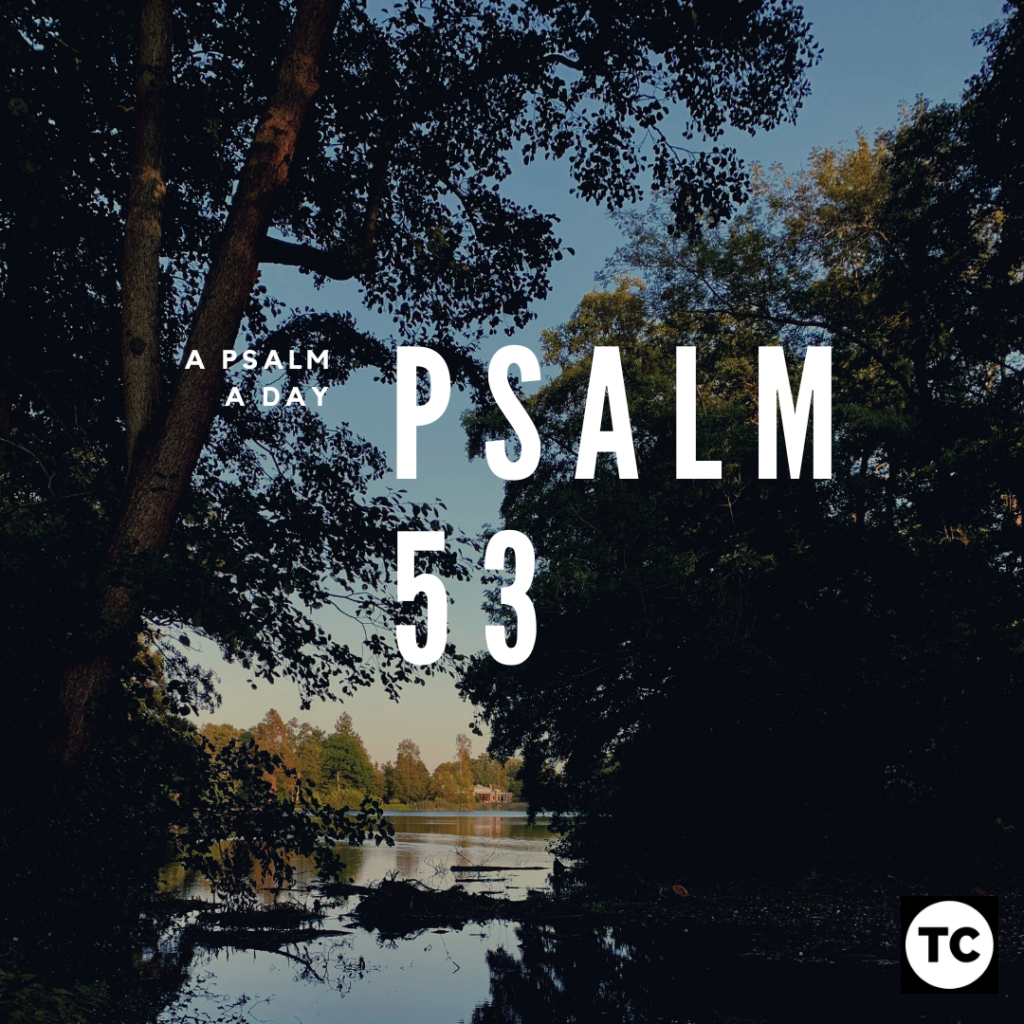Throughout September 2022, I managed to read and reflect – briefly – on a Psalm each day. For December 2022, attempted to pick up the discipline. I got part-way through that month, and so after a long hiatus, am determined to get going. I’ll read the Psalm, pray, and then ponder a few questions:
- What is this Psalm about?
- What does this Psalm teach about God?
- How does this Psalm connect to God’s people today?
I’ll close the post with a simple prayer, trying to draw the themes together.

On the 9th of October 2023, here’s Psalm 53:
1 The fool says in his heart,
“There is no God.”
They are corrupt, and their ways are vile;
there is no one who does good.
2 God looks down from heaven
on all mankind
to see if there are any who understand,
any who seek God.
3 Everyone has turned away, all have become corrupt;
there is no one who does good,
not even one.
4 Do all these evildoers know nothing?
They devour my people as though eating bread;
they never call on God.
5 But there they are, overwhelmed with dread,
where there was nothing to dread.
God scattered the bones of those who attacked you;
you put them to shame, for God despised them.
6 Oh, that salvation for Israel would come out of Zion!
When God restores his people,
let Jacob rejoice and Israel be glad!
What is this Psalm about?
Commentators note that there is overlap with Psalm 14, with only minimal differences. These extend to a change in the divine name, and an extension/tweak in verse 5, which differs from verse 5 of Psalm 14. As I wrote on that Psalm, so for this: The opening words hit our ears and eyes with force – and the first five of seven verses are relentless, it feels. Yet the Psalm is peppered with hints about ultimate reality, and about God. Ultimately, it ends with the eschatological plea that will culminate in Jesus – and be picked up throughout the Psalms. This is an honest Psalm, with much to teach us.
What does this Psalm teach about God?
Firstly, and perhaps paradoxically, Psalm 14 and 53 teaches us about the grace of God. Despite the foolishness of those who don’t believe he exists, God allows them to. Second, this grace extends particularly to the poor – for whom ‘the Lord is their refuge’ – and of course to ‘his people’. The third thing we see about God is that he is active and observant (Verse 2) rather than distant and uninvolved. The replacement of ‘The lord’ with ‘God’ (the key difference between Psalms 14 and 53) reminds us that God is not some abstract, non-specific deity, but ‘The Lord’, a personal and specific God. In a world of many gods and religions, this is a vital reminder.
How does this Psalm connect to God’s people today?
The feeling of being overwhelmed has surfaced in previous Psalms – and one feels perhaps the Psalmist is giving us another gift here. How frustrating it can be when those we love believe there is no God – and more so, when the happenings of the world seem to imply that they are right! Psalm 53 (And 14) reminds us that, no matter what we see, God is there and God is watching. Further, it reminds us that God is the refuge for the poor, and cares for his people – and he will restore. Psalm 53 v5b takes this further – ‘God scattered the bones of those who attacked you; you put them to shame for God despised them’ – God is a God who will judge and deliver judgement, which will be dramatic and final.
A prayer drawn from Psalm
God, you are the one who sees all, knows all, and will judge all. Thank you that you restore your people, and help us not to be evildoers, but instead rejoice with Jacob and be glad with Israel. Amen!
Leave a Reply